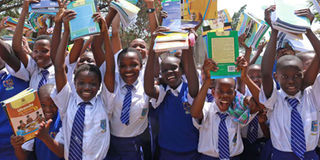Anti-graft agency probes Sh10bn books scam

Kisumu Girls High School students celebrate after receiving text books in January 2018. PHOTO | FILE | NATION MEDIA GROUP
What you need to know:
- Education ministry has been getting more than Sh21 billion annually to purchase books from the National Treasury but most schools do not have books.
- Donors have also pumped billions of shillings into buying of books for public schools.
- Due to corruption in procurement of books, this year the government took over supply of textbooks and claimed that it had saved the taxpayer Sh13.8 billion.
- The government has spent Sh300 billion in capitation under the free primary and free day secondary education programmes.
Top Ministry of Education officials are under investigation over irregularities in the procurement of textbooks worth Sh10 billion for public schools.
The Ethics and Anti-Corruption Commission (EACC) started the investigations last year and is expected to reveal officials behind the scandal, which has seen billions of shillings spent, with no books provided.
The details of the investigations are contained in EACC’s annual report for the year 2017/2018. The agency is looking at how the government-allocated free primary education (FPE) funds were used.
Over the years, the ministry has been getting more than Sh21 billion annually to purchase books from the National Treasury, but reports at the institution indicate that most schools do not have books.
Donors have also pumped billions of shillings into buying of books for public schools.
IMPROVE LEARNING
Currently, there is a Sh5 billion Tusome Project that seeks to improve learning outcomes for classes one and two in Kiswahili and English.
There is also Sh8.8 billion programme funded by Global Partnership for Education (GPE) under the supervision of the World Bank. Under the project, some 4,000 schools have been put on a School Improvement Project (SIP) to boost their Kenya Certificate of Primary Education (KCPE) performance after they recorded a mean of 243 marks. SIP is part of the Priede project.
The project seeks to help raise standards of school management and accountability.
According to a Priede project document released by the Education ministry, the initiative aims at improving learning competencies of lower classes in primary schools by focusing on increasing the early grade mathematics.
CORRUPTION
The project also covers a pilot to improve school performance through strengthened management and accountability in the delivery of primary education.
Due to corruption in procurement of books, this year the government took over supply of textbooks and claimed that it had saved the taxpayer Sh13.8 billion.
This is after it distributed books to schools in January at a cost of Sh7.5 billion, down from Sh21.4 billion.
The current costs are based on the approved text book list, which is called the Orange Book.
A report of the re-tendering conducted by the Kenya Institute of Curriculum Development showed that Orange Book prices are way higher than actual costs.
It is now supplying books directly to 28,000 public public primary schools and 9,000 secondary institutions.
CAPITATION
The government has spent Sh300 billion in capitation under the free primary and free day secondary education programmes.
However, most schools have not attained the 1:1 learner to textbook ratio, denying pupils instructional materials which are important for improving learning outcomes.
In 2016, a report by EACC unearthed massive irregularities in the procurement of textbooks for public schools, with headteachers playing a key role in the racket.
The fraud ranged from forged signatures, delivery of phantom books, overpricing and single-sourcing of suppliers by committees at the school level.
ORDER FORMS
The confidential report by the EACC titled “Examination into the Disbursement and Utilisation of Free Primary Education Funds” blamed the roles played by heads, school management committees and suppliers for the failure to achieve the 1:1 book-to-pupil ratio. It was estimated that the pupil-to-book ratio stood at 5:1 in primary schools against the government target of 1:1.
The EACC report showed that there were cases where the signatures of committee members, chairmen and parents’ representatives in the minute books were different from those in the order forms.
“In other cases, the team was informed that only the headteacher signed order forms issued to suppliers,” the report added.





